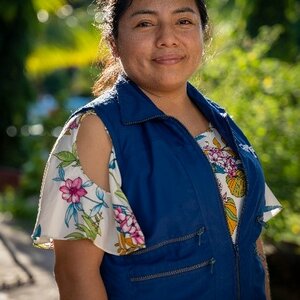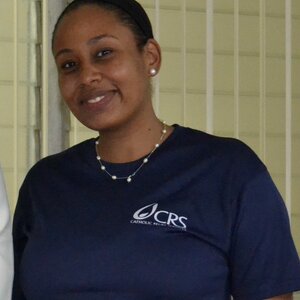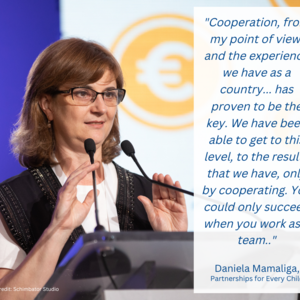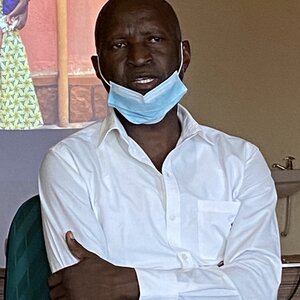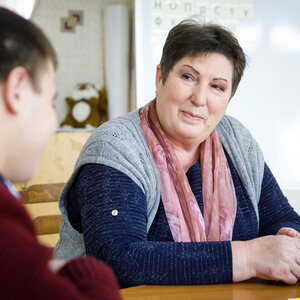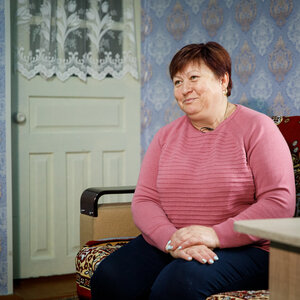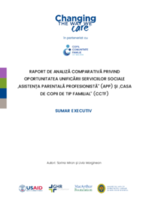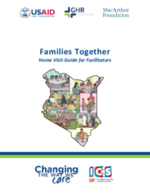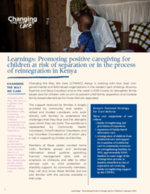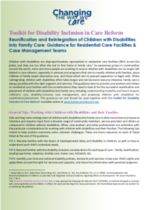Changing The Way We Care℠ (CTWWC) is a Global Development Alliance currently funded by USAID, the MacArthur Foundation and the GHR Foundation, and implemented by Catholic Relief Services and Maestral International, along with other global, national and local partners working together to change the way we care for children around the world. Their principal global partners are Better Care Network, Lumos Foundation, and Faith to Action. CTWWC envisions a world where all children thrive in safe and nurturing families. The initiative works to demonstrate how to enable children to stay in or return to families who are able to provide for their care with the support of governments that promote family care, and influences national, regional and global bodies, donors and faith-based actors towards commitment, practice and resource to family care. Their vision is to be a bold global initiative designed to promote safe, nurturing family care for children.
Contact this organization about:
Organization Size
Headquarters Location
Baltimore, MD
United States
Organization Type
Main Areas of Work
Resources by Theme
CTWWC Kenya
CTWWC Kenya works with the Kenyan government’s Department of Children’s Services, National Council of Children’s Services, county governments and many non-government partners to improve children’s care in Kenya. Key work includes: a national Case Management Package for Reintegration, Alternative Family Care SOPs and Training Package, national gatekeeping guidelines, disability inclusion training, supporting the National Care Reform Strategy development, parenting curriculum and training, etc.
Together with local partners, CTWWC Kenya is strengthening systems, communities and families, strengthening caregivers and families with parenting, economic strengthening and access to services. CTWWC Kenya partners with the Kenyan Society of Care Leavers (KESCA) and other care leaver networks and individuals to ensure their voices are elevated and children/youth leaving care can participate in decisions affecting them. KESCA and CTWWC Kenya have developed a life skills programming and published the Engaging Care Leavers Guidance and Meaningful Engagement Series.
CTWWC Kenya works with many others to change community attitudes and practices in support of family care, working closely with networks and faith communities such as the Coast Interfaith Council of Clerics, the Association of Sisterhoods Kenya, the Association of Alternative Care Organizations, etc.
CTWWC Kenya supports organizations and charitable children's institutions to transform their services by supporting case management for reintegration, strategic organizational development, and more.
CTWWC Kenya has contributed to research and evidence on care in Kenya including situation analysis, COVID impact and a care system assessment - all available on BCN and highlighted in the BCN Newsletter March 2021.
CTWWC Kenya shares learning through regional events and opportunities such as via the network of Catholic Relief Services offices in the region, the UNICEF/CTWWC supported East and Southern Africa Regional Learning Platform, REPSSI and other regional conferences, and various webinars and trainings.
CTWWC India
CTWWC India focuses on preventing the separation of children from their families and their institutionalization, using a family strengthening approach of case management, parenting skills, household economic strengthening and connection to services. CTWWC India works to:
Help state government to establish and roll out case management systems and standard operating procedures for family strengtheng, prevention of separation and reunification/reintegration of children from children's care institutions, including adaptations for the COVID context like virtual case monitoring
Establish and strengthen community-level groups that make decisions about children’s care by setting up Village Child Protection Committees (VCPCs). VCPCs are community groups made up of service providers, community leaders and families who identify, plan, and act upon child protection risks in their villages.
Create awareness campaigns on the harmful impact of child separation and institutionalization, particularly with community actors and with the Catholic Church actors. CTWWC India works with residential care facilities to transition to family support centers - with a focus on Odisha and Tamil Nadu States.
Support local authorities and partners in developing a care reform strategy that includes preventing child separation and institutionalization, taking into consideration the Covid-19 context
Promote family strengthening of at-risk families in collaboration with local district child protection providers. At the national level CTWWC India works with the India Alternative Care Network and UNICEF to influence national policy and practice and conducts research into topics such as public finance and children's care. CTWWC India developed a compilation toolkit on emerging practices in care reform.
CTWWC Moldova
CTWWC Moldova launched in 2019 and is building a collective effort for the continued care reform in Moldova by mobilizing government and community leaders, organizations and families to plan key interventions together. CTWWC Moldova is working closely with and under the new National Programme for Child Protection. CTWWC partners with experienced care reform organizations, government, faith actors, and community based organizations. Government and civil society partners are working together to support the remaining children in residential institutions to reintegrate with families and communities. Partners are also strengthening social services for reunified families, improving case management systems, training workers, and working with local authorities and community organizations to strengthen families.
CTWWC Moldova has completed research which is available on BCN and provides an update on the situation of children and families, social service workers, services, etc. in the country.
CTWWC Moldova focuses on: reunifying children remaining in residential institutions with families, strengthening systems of support to prevent family-child separation, providing expertise to strengthen national care strategies including improvements in the social workforce and case management practices, accessibility and quality of the family, community, and support services available for children and families, advancing public policies and making the case for adjusting public finance to fund community services, engaging faith and community actors to influence public opinion on the above activities, and transforming residential care models to family support services and/or redirecting resources from residential to family care.
CTWWC Guatemala
CTWWC Guatemala helps children currently living in residential care facilities (referred to as protection homes in Guatemala). The initiative does this through: reforming the care system at the national level, strengthening families and commmunities, and advocacy and awareness efforts.
CTWWC Guatemala works at the national level with the four responsible government institutions to build programs and services for children and families including prevention of separation/ family strengthening, case management for reintegration, family-based alternative care, and more. CTWWC Guatemala connects families with community support and existing social services and ensures children are cared for in safe and nurturing families and has adapted to emergency response under COVID.
CTWWC Guatemala trains government staff charged with child protection and care, mentors workers to provide quality case management, conducts research to inform national care reform policy and practice, analyzes state budgets and provides cost comparisons to advocate for family care. CTWWC Guatemala works closely with government and nongovernment partners to prevent unnecessary family separation and promote support services for families, expand family-based alternative care such as kinship care and temporary foster care, ensure children's quality care as related to migration, planned reunification of children from residential care into family-based care, transition or transformation of residential care models (protection homes) to community and family services.
CTWWC Guatemala makes learning from the work in the country available to other countries and organizations via webinars, training and exchanges.
CTWWC Haiti
CTWWC Haiti focuses on preventing the separation of children from their families by building the capacity of community child protection committees, and strengthening families with parenting skills training and economic strengthening. Case management for reunification and reintegration has supported children with disabilities to return to family care - with birth parents, kin and, in some cases, foster families.
CTWWC Haiti works in partnership with community organizations, Catholic Church partners, residential care facilities and community leaders. In response to emergencies, COVID and natural disasters, CTWWC Haiti connects with Catholic Relief Services (CRS) long history with emergency response.
CTWWC Haiti works with Catholic residential care facilities to reunify children and transition to community support services. This experience includes services for children with disabilities. CRS Haiti is a partner to an anti-trafficking initiative in the country, which includes raising awareness around the connection of residential care with trafficking and helping to build capacity for reunification.
Organization Resources
This study analyses the existing family-type social services in Moldova: Professional Parental Assistance (PPA) and Family-Type Children's Homes (FTCH) to identify the rationale for combining the two PPA/ FTCH family care services in terms of the quality of child care and the best interests of children. The study includes a comparative analysis of the regulatory framework of alternative family services and recommendations on the possibility and feasibility of combining the social services. The study concluded that to improve the quality of and access to family-based care services for children at risk, it is recommended that the PPA and FTCH services be merged, that the legal framework of the PPA service be revised, and that the most positive aspects of both services be taken into account.
Acest studiu analizează serviciile sociale de tip familial existente în Republica Moldova: Asistența parentală profesionistă (APP) și Casele de copii de tip familial (CCTF), cu scopul de a identifica argumente privind unificarea celor două servicii de îngrijire de tip familial APP/CCTF din perspectiva calității îngrijirii copiilor și a interesului superior al copiilor. Studiul include o analiză comparativă a cadrului de reglementare a serviciilor familiale alternative și recomandări privind posibilitatea și fezabilitatea unificării serviciilor sociale. Studiul a concluzionat faptul că, pentru a îmbunătăți calitatea și accesul la serviciile de îngrijire de tip familial pentru copiii aflați în situații de risc, se recomandă unificarea serviciilor APP și CCTF, revizuirea cadrului juridic al serviciului APP și luarea în considerare a celor mai pozitive aspecte ale ambelor servicii.
To ensure a significant improvement in service delivery to children and their families, and specifically to the successful reintegration of children from residential care into families and communities, a case management approach, standard operating procedures (SOPs) and tools were required to support state and non-state service providers to standardize the way they promoted family care. This short insight document describes how the case management package was developed and rolled out.
La Guía para facilitadores de “Educando en Familia” es una guía realizada por “Cambiando La Forma en que Cuidamos Guatemala” y está basada en la metodología de Educando en Familia de la Secretaría de Bienestar Social de la Presidencia de la Republica de Guatemala, la guía proporciona herramientas, dinámicas y técnicas para trabajar el programa con grupos de padres, madres y cuidadores; la guía está dirigida a las personas que facilitan el programa o que están certificados para replicarlo por SBS.
Though research has been conducted on children with disabilities and on children in residential care settings, the intersections of these two topics has yet to be explored in depth. Notably, there is a lack of information surrounding disability measurement within residential care settings, highlighting a gap in the literature. It is estimated that a child with a disability is 17 times more likely to be placed in an institutionalized care setting than a child without a disability, and girls are more likely to be placed in an institution than boys. This report details research conducted in Kenya.
Changing the Way We Care prioritizes scaling family care as part of care reform. To support global efforts, CTWWC developed a conceptual framework to scaling within the countries where it works. The country-level conceptual framework presents scaling as a seven-step process. Scaling approaches vary across contexts and countries with there being no one-sized fits all approach.
This Changing the Way We Care Insights Learning Brief describes how systems strengthening alone can lead to scaling of interventions, including interventions that already exist.
This guide is part of the Families Together parenting curriculum for families who have a child reintegrating into the home.
This CTWWC brief describes the family strengthening approach and the people who work with families and children. It shares reflections from facilitators of parenting sessions and the caregivers, themselves.
This guidance aims to provide case workers and others at residential care facilities with the considerations they need to look at for the successful reunification and placement of children with disabilities into family care, including understanding disability and how it impacts children’s care, disability-inclusive case management, and preparing children with disabilities for reunification/placement.




